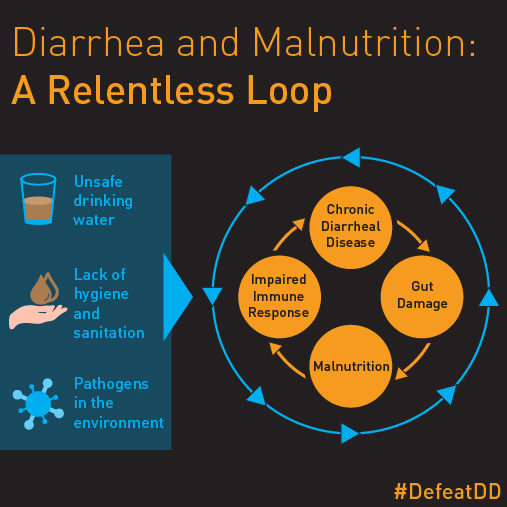Good nutrition and strong minds: What’s the connection?
|

Children need a nutritious diet to grow healthy and strong. If children don't get key nutrients during these critical early years, the impact can be far-reaching.
Malnutrition and diarrheal disease feed off each other in a relentless loop to keep children sick and vulnerable to infections. But if we assume the effects wear off when the symptoms disappear, we're missing a huge part of the story: Chronic diarrhea and malnutrition can stunt physical growth and impact cognitive development, keeping children and their communities from reaching their fullest potential.
But if we assume the effects wear off when the symptoms disappear, we're missing a huge part of the story: Chronic diarrhea and malnutrition can stunt physical growth and impact cognitive development, keeping children and their communities from reaching their fullest potential.
Researchers are beginning to uncover the implications of malnutrition on cognitive development, and study findings reinforce that an integrated approach to prevent and treat diarrheal disease (WASH, vaccines, exclusive breastfeeding, nutrition, and ORS/zinc) is the only way to comprehensively address the vicious cycle of diarrhea and malnutrition and the long-term damage it can cause.
We asked a few experts to weigh in:
“The leaky, chronically inflamed and poorly functioning gut of children exposed to unsanitary living conditions and repeated bouts of infection, including diarrheal disease, has been called ‘environmental enteropathy' or EE . . . EE is associated with malnutrition, failure of the polio and rotavirus vaccines, and poor language and cognitive development . . . Understanding the problem is the first step to a solution.”
- William A. Petri, Jr., MD, PhD, Chief, Division of Infectious Diseases & International Health; University of Virginia. Learn more here.
"A child's organ systems are trying to develop and get to their maximum potential, and that happens very, very quickly. The competition for nutrition is very high. Unfortunately, this is the time children in the developing world get afflicted with diarrhea and other infectious diseases. With a bout of diarrhea, it's very easy for a child to tip off into malnutrition. When their brains are supposed to be developing, when their organs are supposed to be developing, they are completely depleted of these nutrients that they need. Once a child developmentally misses an opportunity to grow, you can never fix that."
- Dr. Roma Chilengi, Chief Medical Officer, Centre for Infectious Disease Research, Zambia.
“The link between malnutrition and cognitive development is powerful and far-reaching. Its effects span not only the lifespan of the individual affected, but also cross generations and can affect the earning potential of individuals and populations. For example, a baby born small for its age is less likely to achieve his or her academic and intellectual potential at school, and in their 50's, 60's, and 70's has a higher risk of developing problems such as high blood pressure, diabetes, and high cholesterol.
Malnourished children often become malnourished parents and the vicious cycle is repeated. Now more than ever before, as the entire global community extends its survival focus to include to include thriving, we all need to work harder and closer together to ensure that every baby, every child, every woman and every man eats a well-balanced meal and is optimally nourished.”
- Dr. Cyril Engmann, Director of Maternal, Newborn and Child Health and Nutrition, PATH. Click here to learn more.
Photo credit: PATH.














